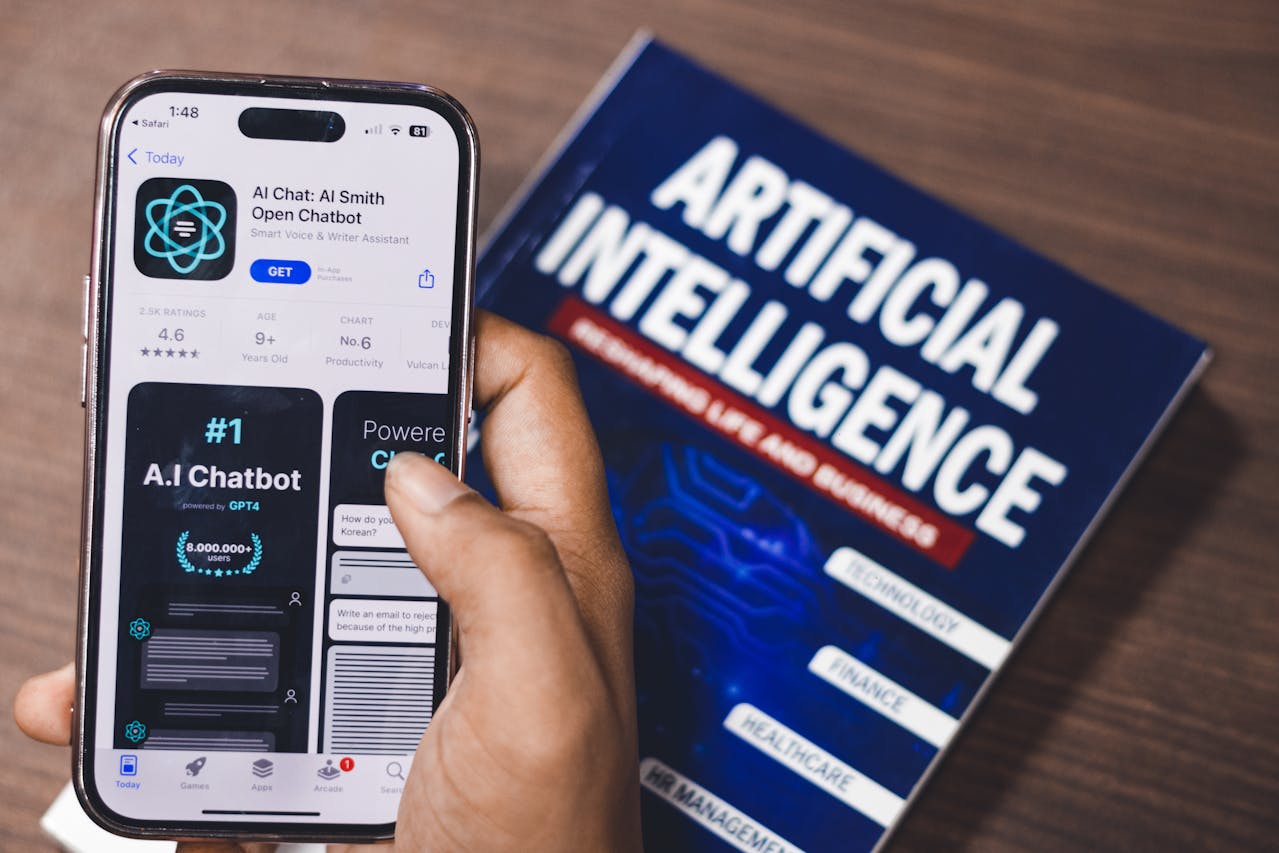Cutting-Edge AI Powered Applications Revolutionizing Diverse Industries

In today’s fast-paced world, businesses and individuals alike are constantly seeking ways to improve efficiency, enhance services, and solve complex challenges. One solution that stands out is the revolutionary power of Artificial Intelligence (AI) applications.
These cutting-edge technologies are not just transforming industries; they’re redefining how we interact with our world daily. From predicting maintenance needs in manufacturing plants to personalizing learning experiences in education, AI-driven automation and innovative solutions are at the forefront of technological advancements.
Did you know that AI applications in 2024 have become a critical driver for innovation across diverse sectors? By leveraging advanced technology like predictive maintenance algorithms and intelligent automation, companies can streamline operations, reduce costs, and offer unprecedented levels of service customization.
This blog post will explore various AI use cases across sectors such as healthcare, finance, manufacturing, and more. We’ll uncover how these transformative artificial intelligence applications revolutionize industries by enhancing productivity, improving customer experiences through personalized services,s reducing operation expenses,and adapting to emerging technologies with remarkable agility.
Discover the future now!
Key Takeaways
- AI applications are changing how industries like healthcare, finance, education, agriculture, and manufacturing work by making processes smarter and more efficient.
- AI brings new ways for businesses to interact with customers through personalized services and improved customer experiences while also tackling complex challenges like fraud detection in finance and disease diagnosis in healthcare.
- With the rise of AI technologies, concerns about privacy, data security, job displacement, and ethical considerations demand careful attention to ensure responsible innovation.
- The future of AI promises even greater advancements across all sectors by integrating with other technologies such as blockchain, IoT, cloud computing, VR/AR, NLP,and edge computing.
- As AI continues to evolve rapidly,it’s creating both opportunities for growth in various fields and a need for individuals to adapt their skills for emerging jobs related to supervisingand enhancingAI systems.
Understanding Artificial Intelligence (AI) Applications
Artificial Intelligence (AI) applications include a wide range of technologies that enable machines to learn, reason, and understand the world. They have a significant impact on diverse sectors like e-commerce, education, finance, healthcare, agriculture, and manufacturing.
Definition and examples
Artificial Intelligence (AI) applications use computers and machines to mimic the problem-solving and decision-making capabilities of the human mind. Examples include voice assistants like Siri, recommendation engines on Netflix, and self-driving cars.
These cutting-edge AI solutions are transforming industries by offering advanced automation, better data analysis, and more personalized customer experiences. For instance, in healthcare, AI-driven algorithms help doctors diagnose diseases faster and more accurately.
In finance, AI systems detect fraud in real time.
The benefits of these innovative AI solutions are vast. They increase efficiency across various tasks, reduce errors made by humans, and can work 24/7 without breaks. Yet there are limitations too; AI requires significant data to learn from and can sometimes make incorrect decisions if that data is biased or incomplete.
AI applications in 2024 are revolutionizing industries by enhancing daily life with cutting-edge technology.
With this foundation in understanding AI’s role today, let’s explore how it applies across different sectors.
Benefits and limitations
AI applications offer numerous benefits and limitations across industries. Here are the key points:
- Improves efficiency and productivity through automation
- Enhances customer experiences with personalized services
- Reduces operational costs and time-consuming tasks
- Increases accuracy and precision in decision-making processes
However, limitations include:
- Dependence on data quality and quantity
- Potential job displacement due to automation
The impact of AI is evident in driving progress and innovation across diverse industries, shaping the future of technology integration and business operations.
AI Applications in Various Industries
AI applications are transforming a wide range of industries, from e-commerce to healthcare. These applications bring about significant changes and improvements in daily operations.
E-commerce
AI is revolutionizing e-commerce, enhancing customer experiences with personalized services and optimizing supply chain management. Advanced AI solutions are driving efficiency, automating processes, and providing real-time insights for improved decision-making.
AI-driven automation in e-commerce is reshaping the industry, increasing productivity while reducing operational costs through predictive analytics and personalized recommendations.
The use cases of AI in e-commerce demonstrate its potential to transform the sector through cutting-edge technology.
The integration of AI in e-commerce showcases how businesses can redefine their operations with the latest technology, leveraging advanced AI applications to enhance customer satisfaction and stay ahead in a competitive market.
From personalized recommendations to streamlined logistics, AI-powered algorithms are shaping the future of online shopping experiences. With the diverse applications of AI in e-commerce, businesses are adapting to this transformative technology to unlock new opportunities for growth and innovation within the industry.
Education
AI is reshaping the education sector through personalized learning experiences, adaptive tutoring systems, and efficient administrative processes. The implementation of AI in education enhances student engagement, provides real-time feedback, and customizes learning paths to cater to individual needs.
Additionally, AI-powered tools facilitate teacher workload management by automating administrative tasks such as grading and lesson planning.
The integration of AI in education underscores its potential to revolutionize traditional teaching methods and offer a more tailored approach to learning. As technology continues to advance, educators are leveraging AI applications to create a more interactive and adaptive learning environment for students.
This shift towards AI-driven automation in education exemplifies how cutting-edge technology is transforming diverse industries.
– Finances
Finances
AI is revolutionizing the finance industry with cutting-edge technology, enhancing processes and services. AIdriven automation streamlines operations, reduces errors, and improves customer experiences.
Real-world applications of AI in finance include personalized investment recommendations based on individual preferences and risk profiles, fraud detection through advanced algorithms, and predictive analytics for market trends.
AI in finances also allows for faster loan approvals by analyzing vast amounts of data to assess creditworthiness accurately. This next-generation application of AI in the financial realm is causing a significant industry disruption and shaping the digital transformation of banking and investment sectors.
The integration of AI applications in real-world financial settings demonstrates its potential to redefine traditional approaches towards money management, paving the way for next-generation solutions that are increasingly tailored to individual needs.
In 2024, banks are utilizing cutting-edge technology to create bespoke customer experiences through AIdriven automation systems that underpin efficient transaction processing while ensuring security.
Additionally, this revolutionary technology has immediate implications within the world of insurance with an expected impact on product development and claim handling procedures as these sectors continue to embrace Industry Revolution driven by artificial intelligence‘s rapid evolution.
Healthcare
AI applications in healthcare are transforming the industry by enhancing patient care, improving diagnostics, and streamlining administrative processes. The integration of AI-powered systems has led to increased accuracy in diagnostic imaging, enabling early detection of diseases such as cancer.
Moreover, AI is revolutionizing personalized medicine through data analysis to develop targeted treatment plans for individuals based on their genetic makeup and medical history. Additionally, AI technology is optimizing hospital operations by automating routine tasks like appointment scheduling and medical record management, leading to improved efficiency and cost reduction.
The impact of AI on healthcare is evident in its ability to enhance patient outcomes, increase operational efficiency, and drive innovation within the industry. These advancements underscore how cutting-edge technology such as AI is reshaping the landscape of healthcare delivery.
Agriculture
AI applications in agriculture are transforming the industry, enhancing productivity, and revolutionizing farming practices. The integration of AI-powered tools in agriculture is optimizing crop management, predicting crop yields, and improving resource utilization.
Cutting-edge technology like AI is reshaping traditional farming methods by providing real-time data analysis for precision farming, enabling farmers to make informed decisions for sustainable agricultural practices.
Additionally, AI is fostering the development of next-generation applications such as autonomous tractors and robotic harvesting systems that are leveraging data analytics and machine learning algorithms to advance agricultural operations towards more efficient and sustainable practices.
Manufacturing
AI applications are transforming the manufacturing industry, revolutionizing production processes and enhancing operational efficiencies. In 2024, cutting-edge AI technologies are streamlining workflows, optimizing resource utilization, and enabling predictive maintenance to minimize downtime.
Real-world applications of AI in manufacturing include intelligent robotics for automation and quality control, advanced data analytics for demand forecasting and inventory management, as well as smart sensors for real-time monitoring of equipment performance.
These next-generation applications empower manufacturers to adapt swiftly to market demands while driving innovation in product development and customization.
The integration of AI in manufacturing is unleashing unprecedented opportunities for growth and competitiveness in the industry. From predictive maintenance to intelligent robotics and data-driven decision-making, AI is reshaping traditional manufacturing operations towards agility, precision, and sustainability.
As industries increasingly adopt AI-powered solutions in their daily operations, the potential impact on job markets becomes a pivotal consideration. The infusion of AI into manufacturing not only optimizes production processes but also presents new avenues for skill enhancement and career progression within an ever-evolving industrial landscape.
Emerging AI Applications
AI is transforming data security, travel and transport, and entertainment with cutting-edge technology. Its applications are revolutionizing diverse industries with real-world impacts.
AI in data security
AI in data security is pivotal for safeguarding sensitive information from cyber threats. Cutting-edge AI-powered applications are transforming traditional security measures by detecting anomalies and potential breaches in real time, thereby fortifying the protection of valuable data.
These advancements enhance threat detection and response times, bolstering cybersecurity across industries and ensuring a proactive approach to safeguarding critical information. The integration of AI in data security is essential to combatting increasingly complex cyber threats, providing organizations with robust defense mechanisms against evolving risks.
The implementation of AI in data security aligns with the growing need for advanced protective measures in an era where digital privacy and integrity are paramount concerns. Organizations across diverse industries leverage AI-driven solutions to proactively mitigate potential vulnerabilities and secure their databases from unauthorized access or malicious activities.
By harnessing the power of AI in data security, businesses can effectively uphold compliance standards, shield customer information from breaches, and reinforce their defenses against sophisticated cyber attacks.
The utilization of cutting-edge technology underscores the significance of prioritizing data protection within modern-day operations while actively mitigating risks posed by ever-evolving cyber threats.
AI in travel and transport
AI is revolutionizing travel and transport by enhancing safety, efficiency, and customer experience. From optimizing routes to predicting maintenance needs, AI is reshaping the transportation sector.
For instance, airlines are leveraging AI algorithms to improve fuel efficiency and reduce operational costs while providing personalized services to passengers based on their preferences.
In the realm of ground transportation, companies are utilizing AI for predictive maintenance of vehicles and real-time traffic management, leading to smoother travel experiences. These advancements not only streamline operations but also contribute to a more sustainable future with reduced environmental impact.
AI in entertainment
AI in entertainment is transforming the way content is created and consumed. Through AI, personalized recommendations are enhancing user experiences, leading to increased engagement and satisfaction.
Additionally, AI-powered algorithms are enabling content creators to analyze audience preferences and trends, allowing for the development of tailored entertainment offerings. This not only improves customer retention but also drives innovation in the entertainment industry.
The integration of AI has unlocked new avenues for creativity and efficiency within the realm of entertainment. As technology continues to evolve rapidly, AI applications are at the forefront of revolutionizing how audiences interact with various forms of media.
– Impact of AI on Human Applications
Impact of AI on Human Applications
AI raises concerns regarding privacy and ethical considerations, urging us to reconsider the implications of its integration into our daily lives. To read more, dive in!
Concerns and ethical considerations
AI in 2024 raises concerns and ethical considerations as it becomes increasingly integrated into various industries. The following are important aspects to consider:
- Privacy: AI applications raise concerns about the security and privacy of personal data, especially in healthcare and finance sectors where sensitive information is involved.
- Bias and Discrimination: The potential for AI algorithms to perpetuate biases based on race, gender, or other factors poses a significant ethical concern.
- Job Displacement: The integration of AI into industries may lead to job displacement, raising questions about the impact on the workforce and future employment opportunities.
- Accountability: As AI systems become more advanced, ensuring accountability for decisions made by autonomous systems becomes crucial in various industries.
- Ethical Decision Making: The development of ethical frameworks for AI applications to ensure responsible decision-making and prevent misuse is imperative.
- Transparency: The need for transparency in how AI algorithms make decisions is essential to building trust and understanding their implications across industries.
- Security Risks: With the increasing reliance on AI, there are growing concerns about potential security risks and vulnerabilities associated with these technologies.
- Regulatory Frameworks: Establishing comprehensive regulations to govern the development, deployment, and use of AI applications is vital for addressing ethical concerns and ensuring responsible innovation.
- Impact on Society: Considering the broader societal impacts of AI integration helps address ethical considerations related to accessibility, equity, and inclusivity in diverse industries.
- Human Oversight: Ensuring human oversight in critical decision-making processes involving AI applications is fundamental to address ethical challenges and maintain control over technological advancements.
Future Possibilities and Integration of AI in Business
AI in business is evolving rapidly, presenting new opportunities and challenges. It’s reshaping industries and fostering innovations that were once unimaginable.
Predicted advancements
AI is anticipated to make significant advancements in the near future, transforming various industries. These predicted advancements include:
- Improved personalization in e-commerce, enhancing customer experience through tailored recommendations and real-time assistance.
- Enhanced educational tools and platforms using AI to adapt learning methods to individual student needs, improving engagement and knowledge retention.
- Advanced fraud detection and risk assessment in the finance sector, ensuring better security and protection for consumers and businesses.
- Precision medicine in healthcare, utilizing AI to analyze vast amounts of patient data for personalized treatment plans and faster diagnosis.
- Smart farming techniques integrating AI to optimize crop yield, reduce resource wastage, and increase sustainable agricultural practices.
- Automated quality control systems in manufacturing, reducing defects and streamlining production processes with AI-powered robotics and vision systems.
- Enhanced cybersecurity measures using AI for predictive threat detection and rapid response to evolving cyber threats in data security applications.
The integration of these advancements will redefine business operations across industries, leading to increased efficiency, accuracy, and innovation while raising ethical considerations related to privacy and security concerns.
Integration with other technologies
AI’s integration with other technologies is unlocking new frontiers and possibilities in 2024. The synergy between AI and blockchain is enhancing data security, while the fusion of AI and IoT is revolutionizing smart devices.
Additionally, the amalgamation of AI with cloud computing is empowering scalable and flexible solutions for businesses. AI’s collaboration with big data analytics is enabling advanced insights and predictive capabilities, driving innovation across industries.
Furthermore, the convergence of AI with virtual reality (VR) and augmented reality (AR) is reshaping entertainment experiences, while its integration with natural language processing (NLP) is advancing personalized customer interactions.
Moreover, the merging of AI with edge computing is enabling real-time decision-making at the network edge. The seamless integration of these next-generation technologies ensures that cutting-edge AI applications continue to revolutionize diverse industries in exciting and impactful ways.
Potential impact on job market
AI’s integration into diverse industries may lead to significant shifts in the job market. NextGeneration Applications are Automating routine tasks, potentially leading to a transition in job roles.
For example, AI in healthcare could augment diagnostic processes, altering the landscape for medical professionals. Furthermore, AI applications in real-world scenarios are projected to create new job opportunities centered around supervising and enhancing AI systems across different sectors.
As Cutting-Edge AI Powered Applications Revolutionize Diverse Industries, adaptation and upskilling will be crucial for individuals navigating these changes.
Potential Impact: Job Market
Conclusion
AI applications in 2024 are reshaping diverse industries, driving efficiency and innovation. These cutting-edge technologies are enhancing customer experiences and revolutionizing how businesses operate.
The practicality and potential impact of AI integration can lead to significant improvements across various sectors. Consider exploring additional resources for continued learning beyond this article.
Embrace the power of AI to drive progress and innovation in today’s evolving world.
FAQs
1. What are cutting-edge AI powered applications?
Cutting-edge AI powered applications are advanced tools that use artificial intelligence to change how industries work, making tasks easier and faster.
2. How do these applications impact real-world industries?
These AI applications improve efficiency, accuracy, and productivity across diverse industries by handling complex tasks quickly.
3. Can you give examples of industries revolutionized by AI?
Yes! Industries like healthcare, finance, transportation, and entertainment see huge benefits from using cutting-edge AI technologies for better results.
4. Why is it important for industries to adopt these AI applications?
Adopting these AI-powered applications helps industries stay competitive by optimizing operations and offering innovative solutions to challenges.





